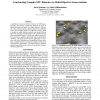Free Online Productivity Tools
i2Speak
i2Symbol
i2OCR
iTex2Img
iWeb2Print
iWeb2Shot
i2Type
iPdf2Split
iPdf2Merge
i2Bopomofo
i2Arabic
i2Style
i2Image
i2PDF
iLatex2Rtf
Sci2ools
AIIDE
2008
2008
Constructing Complex NPC Behavior via Multi-Objective Neuroevolution
It is difficult to discover effective behavior for NPCs automatically. For instance, evolutionary methods can learn sophisticated behaviors based on a single objective, but realistic game playing requires different behaviors at different times. Such complex behavior is difficult to achieve. What is needed are multi-objective methods that reward different behaviors separately, and allow them to be combined to produce multi-modal behavior. While such methods exist, they have not yet been applied to generating multi-modal behavior for NPCs. This paper presents such an application: In a domain with noisy evaluations and contradictory fitness objectives, evolution based on a scalar fitness function is inferior to multi-objective optimization. The multi-objective approach produces agents that excel at the task and develop complex, interesting behaviors.
| Added | 02 Oct 2010 |
| Updated | 02 Oct 2010 |
| Type | Conference |
| Year | 2008 |
| Where | AIIDE |
| Authors | Jacob Schrum, Risto Miikkulainen |
Comments (0)

